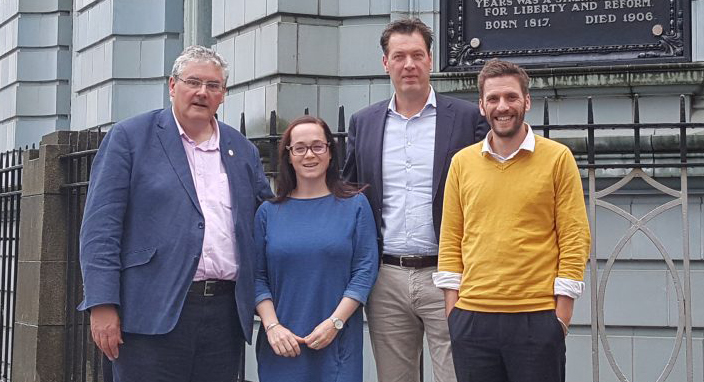How can co-ops design a successful membership proposition? This question is a key concern for the Netherlands Co-operative Council. Arjen van Nuland, chief executive of the council was a keynote speaker at the UK Society’s for Co-operative Studies annual conference in Newcastle on 2-3 September. He looked at the main challenges faced by old and new co-ops in the Netherlands.
The council was set up 85 years ago as a trade body for co-ops in agriculture, finance and insurance. However, three years ago it decided to open its doors to co-ops in other sectors.
Mr Nuland has been leading the federation since 2013, having guided the organisation through a reform process that has seen it double its membership from 50 to 100 members, which account for more than 90% of Dutch co-ops’ turnover. Around 80-85% of the council’s income comes from membership contributions.
The country’s first co-ops started emerging around 150 years ago in the financial sector, using the model provided by Friedrich Wilhelm Raiffeisen. Agriculture was the other main sector during the movement’s early days. The first agri co-ops were created by Gerlacus van den Elsen, a Catholic priest who helped found Coöperatieve Centrale Boerenleenbank. Between 1895-1920 co-operatives were established in almost every large village.
The Netherlands has now over 2,500 active co-ops, with agriculture and finance remaining the largest sectors. Around 70% of agricultural turnover is in co-ops, way above the EU’s average of 45%.
Along with traditional co-ops with a long history that have been set up in these two sectors, new co-ops have been founded over the past 50 years in energy, housing, industries or health and social care. However, these newer co-ops account for only 5% of the total turnover of Dutch co-ops.
Old and new co-ops face different challenges. For newly established co-ops the main focus is to become sustainable. For traditional, larger co-ops with a long history, the key issue is maintaining democracy once they achieve scale.
“When you have a big number of members the difference between members also becomes greater as well so you have to diversify the membership strategy,” said Mr Nuland.

Since the federation is representing both types of co-ops, the council is supporting newer co-ops in gaining a professional structure and assisting older co-ops in maintaining their co-operative ethos even after they reach scale. They focus on aspects such as re-strengthening co-ops through new ways of governance, consolidating members’ influence and improving communication.
Mr Nuland explained how co-ops had to reinvent themselves with every generation.
“My grandfather was a father and a supporter of co-ops. He experienced that he couldn’t manage it by himself. The next generation didn’t experience that. As a member of the co-op, you have to see the value of the structure,” he said, adding that sometimes members failed to see the value on the membership proposition.
“Co-ops need to develop new ways of connecting members and add value to membership because if they do not the members will act like consumers and will not feel connected to their own company any more,” he added.
Related: Cooperatives Europe responds to Juncker’s State of the Union speech
To address the issue of member involvement in co-ops, particularly larger co-ops, the council developed a co-operative academy, which aims to enable members to play a better role in the governance of their co-op. They also publish a magazine four times a year, which gets sent out to members and politicians.
“If the distance between co-ops and members becomes bigger then members don’t see the value of the co-op anymore and you have to rebuild a proposition that is valuable for members and fits in the modern days,” commented Mr Nuland.
An enabling legislation provides a framework for businesses to become co-ops but actually being a co-op is different, he added.
The world’s largest flower market Royal Flora Holland is a co-op. It has a range of members, with turnovers between €20,000 and €20m. “So the interest of small members is different from the one of large members. The business is different. That’s what we see with big co-ops the diversity in membership is huge.
“It is difficult to have a one size-fits all strategy, co-ops have to diversify strategy in membership proposition.”
In addition to supporting existing members, the council works to enable businesses establish as co-ops. For two years now the federation has running a help desk for start-up co-ops, advising them whether the co-op is the right model for them. Then if they want to set up as a co-op they can hire the council to advise them.
Mr Nuland specified that the aim of the council was not to necessarily establish more co-ops but raise awareness of the model and help those for whom it is a goof fit implement it.
To engage with its members the council has regular meetings with them and organises small events and pop-up labs where members can share best practices.
They recently hosted a pop-up lab on how to revitalise a members’ council. Members also get to explore issues such as attracting young people in board positions. Dutch co-ops will also be celebrating the National Co-operative Day on 23 November, which this year is themed around the participation of different generations in co-ops.
With their membership doubling, the council is also now in a position to represent the sector in discussions with government.
“This year along we had input in tax, franchise co-ops and competition law,” said Mr Nuland.
However, co-ops face in the Netherlands continue to have difficulties in making the case for why they should be treated differently from other enterprises.
“Co-ops contribute 18% to the GDP of the Netherlands. But we don’t get recognition from the government or the society because we don’t present ourselves as co-ops. We need to start telling again about co-ops not just old co-ops,” added Mr Nuland.